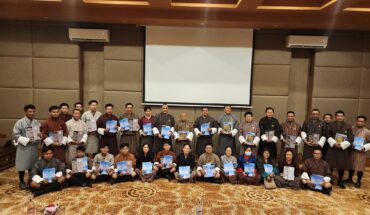
Machinery shortage and the aging fleet of combine harvesters and their frequent breakdowns blamed
NGAWANG JAMPHEL
Thimphu
The Member of Parliament (MP) from Lamgong-Wangchang Constituency, Sonam Tashi, raised concerns in the National Assembly regarding delays in paddy harvesting in Paro.
He attributed these delays to the aging fleet of combine harvesters and their frequent breakdowns. He said farmers in the region face challenges in completing their harvest on time, impacting their productivity and livelihoods.
In response, the Minister for Agriculture and Livestock, Lyonpo Younten Phuntsho, acknowledged the issues, highlighting the government’s commitment to ease the burden on farmers. He noted that combine harvesters are crucial for farming operations, similar to power tillers and tractors. However, the minister revealed that only 24 combine harvesters are available nationwide, with 21 in working condition, and 20 of them stationed in Paro.
Mechanization Challenges and Government Support
In 2023, 900 of Paro’s 2,599 acres of paddy fields were harvested using combine harvesters. This year, 875 acres have been harvested so far, but the shortage of functional machines has slowed progress. Lyonpo stated that the high cost of combine harvesters—ranging between Nu 1.1 million and Nu 1.5 million—makes them unaffordable for most farmers. Maintenance costs, which average Nu 40,000 to Nu 50,000 annually, further compound the problem.
The minister also pointed out the operational limitations of these machines, which are only used for two to three months a year and require skilled operators. To mitigate these challenges, the Farm Machinery Corporation Limited (FMCL) provides harvesting services to farmers. However, the need for additional machines remains critical.
While the government has not yet implemented subsidies for combine harvesters, Lyonpo expressed willingness to explore such measures if farmers are prepared to bear 50% of the cost. The ministry is also collaborating with the Japanese government to enhance agricultural practices and improve the mechanization process.
“We remain committed to supporting farmers in addressing these challenges. If people are willing, the Ministry will conduct research to assess the feasibility of providing subsidized machinery for individual or group use,” Lyonpo said.
Beyond Paro, MP Namgay Wangchuk from Lingmukha-Toedwang Constituency questioned the ministry’s broader approach to mechanization and regional development. Lyonpo Younten Phuntsho emphasized that the ministry is implementing mechanization initiatives under the Economic Stimulus Plan (ESP) to address labor shortages and reduce wildlife conflicts.
Farmers can now access reduced-interest loans to purchase machinery, easing the financial burden and encouraging mechanized farming. Additionally, the government continues to provide support through land management programs tailored to specific regional needs, considering factors such as terrain and land size.
The MP for Sergithang-Tsirang Toed, Karma Dorji, brought up concerns regarding the lack of cold storage facilities and warehouses to support the growing agricultural and livestock production in Tsirang. Farmers in the region struggle to access fair prices for their produce due to limited infrastructure, he said.
Responding to these concerns, Lyonpo Younten Phuntsho acknowledged the difficulties faced by farmers and outlined the government’s efforts to address the issue. Under the national food security policy, cold storage facilities and warehouses are being developed across different regions.
“The government has set a production target of Nu 5 billion, and these facilities are crucial to achieving that goal,” Lyonpo stated. However, he urged farmers to make effective use of the costly infrastructure once operational.
The lack of storage facilities has long hindered farmers from selling their produce at fair prices, often forcing them to sell perishable goods at reduced rates. The government’s initiatives aim to enhance market access and ensure that farmers receive equitable returns for their labor. The Ministry of Agriculture and Livestock (MoAL) is actively working to align these efforts with Bhutan’s broader goal of achieving self-sufficiency in food production.
The MP for Bji-Katsho-Uesu, Dorji Wangdi, sought updates on government support for yak farming, a critical livelihood for highlanders in Bhutan. He highlighted pressing issues such as declining yak populations caused by diseases, climate change, and shrinking rangelands.
Lyonpo Younten Phuntsho stressed the cultural and economic importance of yak farming, noting that highlanders play a vital role in preserving Bhutan’s traditions. To address the challenges, the government has allocated Nu 20 million for artificial insemination services and Nu 30 million for rangeland protection.
Yak populations have been dwindling due to various factors, including reduced grazing areas and increased vulnerability to diseases. Artificial insemination is expected to improve the genetic pool and enhance the productivity of yaks, while rangeland protection initiatives will ensure that highlanders have access to sufficient grazing areas.
The minister also assured that additional measures are in the pipeline to support highlanders, emphasizing the government’s commitment to sustaining this traditional way of life.
Addressing regional disparities in mechanization, Lyonpo Younten Phuntsho highlighted the government’s ongoing efforts to ensure equitable development across the country. He emphasized that mechanization initiatives, such as providing access to reduced-interest loans for machinery, are part of a broader strategy to modernize Bhutan’s agricultural sector.
The government’s approach takes into account the unique challenges faced by farmers in different regions, such as labor shortages, wildlife conflicts, and difficult terrain. “We are committed to ensuring that no region is left behind in our efforts to modernize agriculture and improve productivity,” Lyonpo said.
Collaboration with International Partners
The ministry’s collaboration with the Japanese government is a key component of its strategy to enhance mechanization. Japan has been a longstanding partner in supporting Bhutan’s agricultural sector, providing equipment and technical expertise to improve farming practices.
Despite the government’s efforts, challenges remain. Farmers in Paro continue to face delays in paddy harvesting, and the lack of infrastructure in regions like Tsirang limits the potential for growth in agricultural and livestock production. For highland communities, sustaining yak farming requires continued government intervention to address the impacts of climate change and diseases.
The Ministry of Agriculture and Livestock has assured its commitment to addressing the challenges faced by Bhutanese farmers, from mechanization and infrastructure development to yak farming support.





